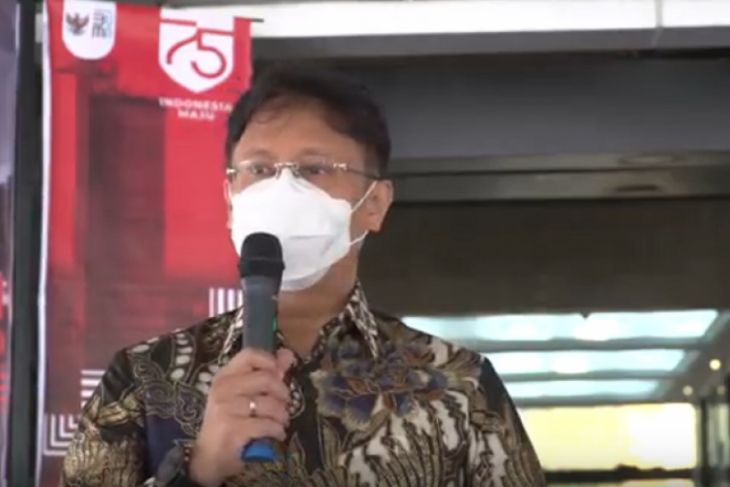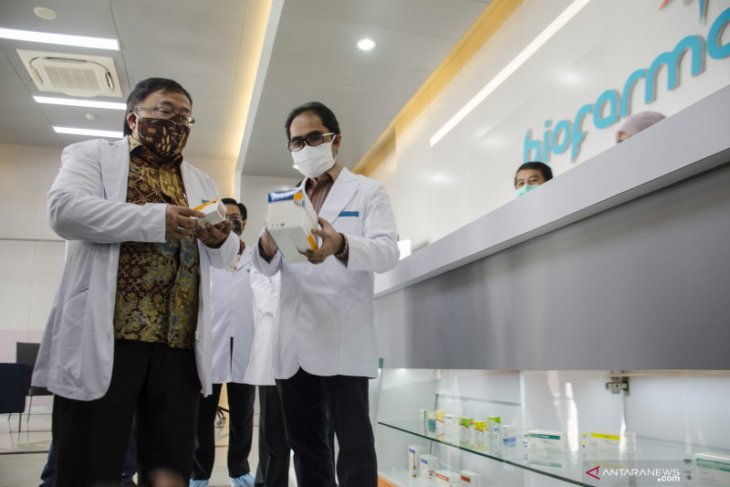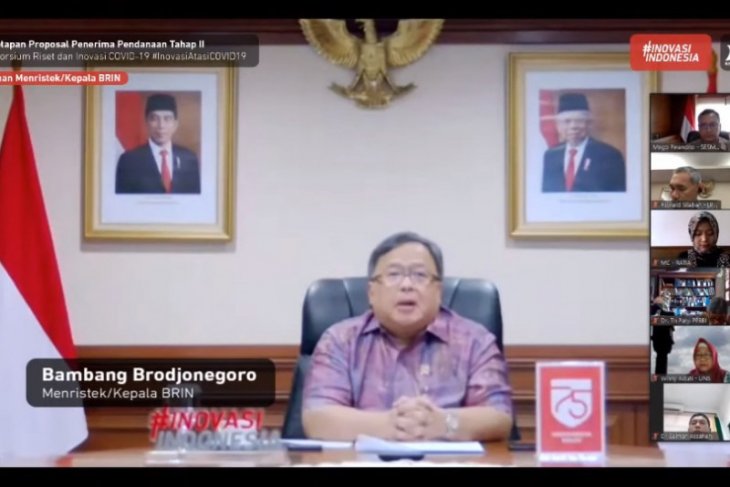Live Streaming
Program Highlight
Company Profile
August
Government to Provide Aid to 13.8 Million Low-Wage Workers in Q3
Written by Ani Hasanah
Chief of the Task Force for National Economic Transformation and Recovery (PEN), Budi Gunadi Sadikin. (ANTARA/Aji Cakti/sh)
Formal workers with an income of less than Rp5 million per month will receive government aid in the third quarter of this year, according to the Task Force for National Economic Transformation and Recovery (PEN).
The aid, which will be disbursed under the first phase of the latest government stimulus for formal workers impacted by the coronavirus pandemic, will reach recipients by September at the latest, it revealed.The aid will be distributed to those workers who are registered on the Workers Social Security Agency (BPJS Ketenagakerjaan) database and who are not civil servants or employees of state-owned enterprises.
Under the program, about 13.8 million workers will receive Rp600 thousand per month for four months this year, which will be disbursed in two stages.
"The first phase of the aid will be disbursed in the third quarter and the second phase in the fourth quarter," chief of the task force, Budi Gunadi Sadikin, said at an online press conference at the Presidential Office in Jakarta on Friday.
Sadikin said the aid is aimed at formal workers impacted by the COVID-19 pandemic who are yet to be covered by the government's social safety net program. Many of them have been forced to take unpaid leave, while others have faced salary cuts due to slowing business.
Earlier, the government had provided social assistance for low income households affected by the pandemic through the Family Hope Program (PKH), Basic Needs Card, cash transfer (BLT), village fund cash transfer, and interest rate subsidy for micro, small and medium-scale enterprises (MSMEs).
According to Sadikin, who is concurrently the Deputy Minister of State Enterprises, the government has provided social assistance to 29 million of the poorest families, or about 120 million people.
In addition, the government has launched a Pre-Employment Card for laid-off workers.
"We see that this group of workers (formal workers) is yet to be covered by those programs. The President has instructed (us) to design a program to help these workers," he added.
The task force has identified about 13.8 million formal workers who are eligible for the aid, and the government has allocated Rp33.1 trillion in funds for the relief program.
“We are cooperating with the BPJS Ketenagakerjaan, we have browsed the data and identified formal (workers) with salaries lower than Rp5 million per month, most of them with salaries between Rp2 million to Rp3 million. There are 13.8 million of such workers, and they are not SOEs employees nor civil servants, who did not face salary slashing, Alhamdulillah (thank God),” he elaborated.
The aid is expected to improve people's purchasing power, which could help stimulate economic activity, Sadikin explained. (ANTARA)
August
Industry Minister Optimistic on Economic Rebound in Q3 2020
Written by Ani Hasanah
Industry Minister Agus Gumiwang Kartasasmita. (ANTARA/HO-Industry Ministry/pri/sh)
Indonesia's Industry Minister Agus Gumiwang Kartasasmita said he is optimistic the economy will improve in the third quarter of 2020, with the manufacturing sector driving growth.
"I am sure (the economy) in the third quarter will rebound," Kartasasmita said in a statement here on Friday.
The government has unveiled several stimulus measures for industry players, including small and medium scale enterprises, to boost their performance, he noted.
"The government has disbursed various stimulus (packages) for the business world, the latest was the abolishment of the minimum electricity cost for industry. We have prepared a special working capital stimulus especially for the industry sector," he elaborated.
The ministry would continue to work towards improving the manufacturing Purchasing Managers' Index (PMI) so it rises above 50.0 points in the third quarter of the year.
A survey released by IHS Markit has shown Indonesia’s manufacturing PMI in July, 2020 rose to 46.9 from 39.1 a month earlier. The improved reading on the index reflects an improvement in business confidence on the back of better market conditions.
The Central Bureau of Statistics (BPS) has reported a 5.74-percent contraction in non-oil and gas processing industry for the second quarter of 2020 due to the COVID-19 pandemic.
Meanwhile, the Indonesian economy shrank by 5.32 percent year-on-year during the period, as per BPS data.
The industry sector made the largest contribution of 19.87 percent to the Gross Domestic Product during the period. (ANTARA)
August
Universities Encouraged to Contribute to National Industry Development
Written by Ani Hasanah
Minister of Research and Technology/Head of the Indonesian National Innovation Research Agency Bambang Brodjonegoro (left) speaks with Bio Farma President Director Honesti Basyir (right) during a working visit to Bio Farma, Bandung, West Java, Wednesday (29/7/2020). ANTARA / Novrian Arbi
Minister of Research and Technology/National Research and Innovation Agency (BRIN) Head Bambang P. S. Brodjonegoro encouraged universities to contribute to development of the national industry through research, development, assessment, and application activities.
"Innovation can be conducted at every stage of R&D (research, development, assessment, and application) to produce superior innovative products. A paradigm shift is necessary from all lines to become an 'innovation-based economy' (an innovation-based country)," Brodjonegoro noted in a written statement received by ANTARA in Jakarta, Friday.
Brodjonegoro remarked that Indonesia envisions becoming a high-income developed nation by 2045 when it celebrates 100 years of independence.
During a virtual seminar themed “Advanced Indonesia Based on National Research and Innovation: The Role of Higher Education in National Industrial Development” organized by Telkom University on August 5, 2020, Brodjonegoro highlighted the need for a breakthrough through innovation to become a developed country.
Minister Brodjonegoro stated that the manufacturing sector remains at the forefront for boosting national economic growth. Hence, for development of the manufacturing industry, a breakthrough is necessary to boost competitiveness based on innovation.
Emphasis on policy programs and policy instruments, such as incentive funds for the Ministry of Research and Technology (Kemristek)/BRIN in the next five years, will lead to the implementation of a "triple helix" of academicians-business-government that in essence is a synergy between universities, ministries and institutions, industry, and government.
The minister noted that research and innovation entails a new mindset, behavior, culture, and way of working. These three can be covered in research-based learning and innovation.
"Triple helix" synergies in COVID-19 prevention comprise involving a consortium of research and innovation, including various non-ministerial research institutions (LPNK), universities, industry, Ministry of Health, Ministry of SMEs, Ministry of Industry, and the private sector synergizing together in the direction of the Ministry of Research and Technology/BRIN.
Thus, in a short span of time, several innovative products can be manufactured, including PCR test kits, rapid tests, autonomous UVC mobile robots, convalescence serum, artificial intelligence systems for COVID-19 detection, immunomodulators, mobile Lab BSL-2, ventilators, and powered air-purifying respirators.
Brodjonegoro affirmed that the present and future changes in several fields during the post-COVID-19 era will change the economic paradigm that will adapt to new habits and regulations in the fields of technology migrating to contactless, human behavior in the context of immune certifications, industrial dynamics, geopolitics, regulations pertaining to new privacy laws, and macroeconomics within the context of limited access to capital.
Furthermore, the minister pointed to 10 technological trends during the COVID-19 pandemic: online shopping and entertainment, digital payments, supply chain 4.0, work-from-home or teleworking, 3D printing, telemedicine, robots and drones, online education and training or tele-education and training, as well as 5G technology and information communication technology, all of which will lead to economic digitization. (ANTARA)
August
Business Continuity of MSMEs Hinges on Boosting Purchasing Power
Written by Ani Hasanah
Minister of Research and Technology (Menristek)/Head of the National Research and Innovation Agency (BRIN) Bambang P. S. Brodjonegoro. Antara/HO-UI
Research and Technology (Menristek) Minister/National Research and Innovation Agency (BRIN) Head Bambang P. S. Brodjonegoro opined that boosting the public's purchasing power was crucial for maintaining the continuity of micro, small, and medium enterprises (MSMEs).
"Indeed, the government has made several efforts to restore the economy during the current pandemic. Many MSMEs cannot survive during the pandemic. Those able to survive are the MSMEs with exposure to digital economy. Going forward, digital economy is expected to become one of the backbones of the national economy," Minister Bambang P. S. Brodjonegoro noted in a written statement received in Jakarta on Friday.
The Central Statistics Agency (BPS) had announced that Indonesia's economy contracted by 5.32 percent in the second quarter of 2020.
Responding to the condition, Brodjonegoro affirmed that various steps under the framework of the National Economic Recovery (PEN) should be taken promptly, including being heedful of MSMEs as a precautionary measure against recession in the third quarter.
The minister highlighted that based on the results of a study by the Indonesian Institute of Sciences (LIPI) 2020, the sales of MSME products had declined. Based on survey results, a 94.69-percent decline was registered.
"What remains is only 2.65 percent, which also increases 2.65 percent. Most MSMEs have vulnerabilities within the next six months, which will eventually lead to poverty," Brodjonegoro, as the main speaker at the virtual seminar “Indonesian MSMEs” stated on Thursday (July 6).
The minister noted that increasing the purchasing power was the key to economic recovery. The purchasing power or public consumption is the factor that drives the economy.
Hence, the government remains steadfast in its commitment to maintaining domestic purchasing power and demand in the context of restoring the national economy.
"The people's purchasing power will be maintained, through social assistance and subsidies, for the poor and vulnerable," Brodjonegoro remarked. (ANTARA)


